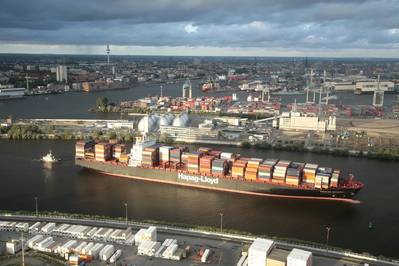Hapag-Lloyd to Introduce Cleaner Fuel Charges from 2019
German container shipping giant Hapag-Lloyd said on Monday it is preparing customers for a mechanism to charge more for cleaner fuel starting next year to comply with tighter environmental rules.
The Hamburg-based firm said on Monday that it has developed what it will call a marine fuel recovery mechanism (MFR), which it will gradually introduce from Jan. 1, 2019.
This will entail an automatic addition of charges to cope with costlier clean fuel from the fourth quarter of 2019, a staggered procedure to account for some ships that may embark on long journeys during that period stretching into 2020.
"We are confident to have found a fair and transparent way in which the polluter pays," a Hapag-Lloyd spokesman said.
With a stricter International Maritime Organization emissions regulation (IMO 2020) coming into force in 2020, the new sulphur cap for compliant fuel oil will be lowered to 0.5 percent from 3.5 percent - involving a $250 per tonne price spread at current rates charged by refiners for the product.
The IMO agreed the target in April after years of debate to help cut carbon dioxide emissions from shipping by at least 50 percent by mid-century from 2008 levels, and has said it will ban or fine non-compliant operators.
Hapag-Lloyd, the world's fifth largest container line, expects it will have to pay $1 billion more annually for low sulphur fuel in the first few years after the IMO regulation takes effect.
The MFR formula combines consumption patterns of each vessel as well as cargo sizes, sea and port times with market prices for fuel oils.
While there is no alternative to this action, the company said, it would also continue to analyse other technological options to lower emissions.
These include scrubbers that clean exhaust gases, which bigger rival Maersk says it will invest in among other measures , and possible switches to ships running on liquefied natural gas (LNG), the spokesman said.
(Reporting by Vera Eckert, editing by Mark Heinrich)


















